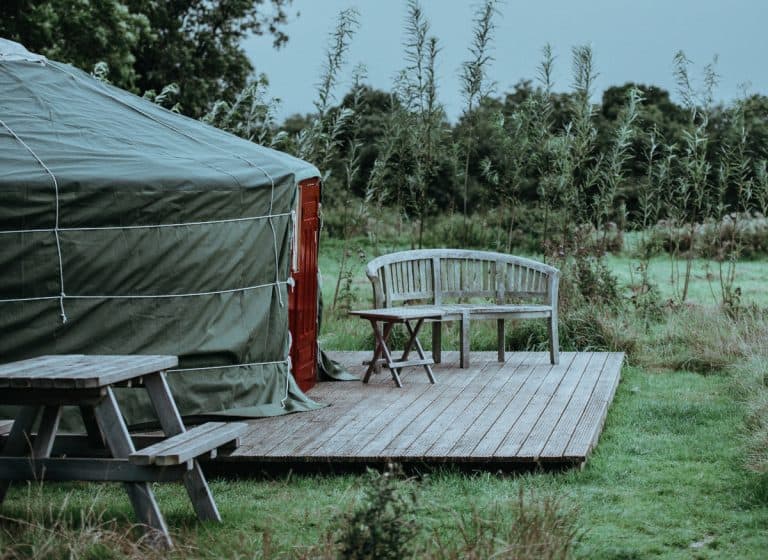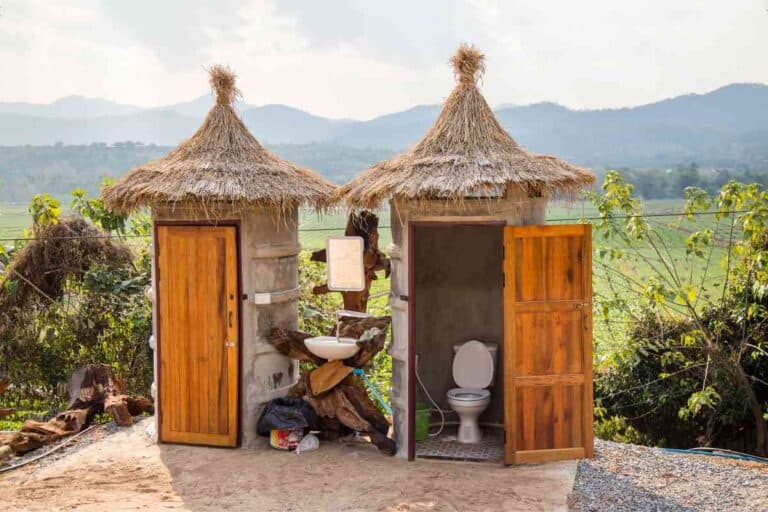Are Yurts a Good Real Estate Investment?
Buying an investment property can be a great way to grow your net worth, and many financially independent individuals started their passive income stream by acquiring a rental. But this road to riches is no secret, and as more and more investors enter the housing market, they drive up property prices. So why not do something different, like investing in a yurt?
Yurts can be excellent real estate investments and provide very high returns, as long as the process is thought through. It is important to be aware that yurts offer different opportunities and require other preparations than the more traditional real estate options.
Let’s look into what makes yurts appealing for those looking to invest in a somewhat unusual income source and the potential downsides.
Modern Yurts Can Be Luxurious
While yurts all used to be essentially large tents, this is no longer the case. They can be very basic and offer no other conveniences besides shelter and perhaps a wood stove, but they can also contain all the benefits of running water and electricity that most of us enjoy every day. These two approaches appeal to very different renters.
While the primitive version is somewhat cheaper to buy and run, you are much more likely to find renters if you offer running water, a bathroom, and electricity. Not only will you attract a larger range of customers, but you will also be able to charge significantly more per day – much more than the additional costs.
What Makes Yurts Good Investment Properties?
Strictly speaking, there are three ways of making money from property:
- long-term rental
- short-term holiday rental
- value appreciation
Value appreciation is not a great strategy if you invest in yurts, as yurts lose value fairly quickly. That leaves us with the two renting options. You could try to rent it out on long-term leases, which would save you the hassle of meeting new visitors and cleaning the yurt after each visit. But long-term yurt rental is a very narrow niche, and it could be hard to find renters looking for a yurt-home in your area. Besides it being a niche market, yurts are also very affordable, and many of those dreaming of living in one will be inclined to buy their own yurt.
That leaves us with the option of investing in yurts as vacation rentals, which could be very lucrative. Many vacationers like to try uncommon accommodation types instead of a boring house or apartment rental, and they will not take the low cost of buying a yurt into consideration when judging the value of renting it. At least not if the yurt is presentable and includes modern conveniences.
Low Cost and High Rental Income
Yurts on Airbnb rent for $140 a night, with rates varying from $68 to $216. Assuming an estimated (conservative) 25% occupancy rate, that equals an annual gross income of $12,775. Not too bad for a property that costs $12,000 to $30,000 to buy. Of course, you will also have to pay for connecting the yurt to municipal services or setting up off-grid water and electricity production. However, the entire setup should still be able to pay for itself within two to three years.
Low Maintenance
Yurts require very little maintenance. It is necessary to clean after each visit and ensure sufficient ventilation to keep mold and mildew from appearing. But besides that, there is very little work to do. Eventually, you will have to change the fabric cover, but a quality cover should last fifteen years or longer.
Easy to Scale
Setting up a yurt requires no tools and very little time and energy. As they are very affordable, it costs relatively little to build more yurts later as needed. If you own enough land and are able to obtain the necessary permits, you can start with one yurt and then expand as your current rental income can pay for these new additions.
This level of flexibility and scalability is much harder to do with conventional real estate investments, as every new property is a big financial commitment.
Freedom to Rent
Unlike most condos and many houses, your yurt will probably not be located within the jurisdiction of a homeowner’s association. Meaning, you do not have to ask for permission to rent it out.
Yurts Are Unique
The uniqueness of a yurt will appeal to many people. Some dream of owning their own yurt and will want to try it out before they build one; others just want to experience something different when they go on vacation. Still others enjoy the closeness to nature but prefer the combination of a luxury “tent” over an ordinary tent.
Whatever the reason, you should be able to find lots of renters as long as the location is carefully selected. Yurts are typically built close to nature in locations with beautiful views. As yurts are easy to set up, you may be able to place it on a particularity attractive spot where it is not possible to build a house or a cabin due to regulations or impracticality.
Cons of Yurts as Investment Property
Not all is perfect, though, and yurts do have some downsides.
High depreciation
As mentioned, yurts depreciate fairly quickly, and they certainly do not gain value. The land below it may, but not the yurt itself. This means you will not be able to take advantage of a potential rise in housing prices. In some places, this could be a significant opportunity cost.
Financing
As yurts are depreciating assets, lending companies are hesitant to offer loans, and if you do not have the cash to buy a yurt outright, it can be difficult to finance the purchase. This does not mean it’s impossible, but you will likely have to pay a higher interest rate than a typical mortgage loan. You will also have to be more creative when looking for loans.
Considering the potential income from renting out a yurt, it may still be worth the higher interest payments, although I suggest you save a large down payment and pay the loan off as soon as possible.
Approval
Getting the permits to set up a yurt can be easy, complicated, or impossible. This highly depends on local authorities, zoning regulations, and building codes. Yurts can be considered tents or permanent structures, depending on city ordinances. Oftentimes this depends on whether the yurt is placed on a solid foundation.
As the regulations vary from state to state and from county to county, so will your options, and possibly also your decisions on where to buy land. Make sure to research this throughout before making any financial commitments.
Utilities
While you can get all the modern necessities in a yurt, it may not be available in your location. Some of the most scenic locations are far from the electric grid and public sewer systems. In which case, you will have to find alternative solutions. Such solutions could be water harvesting as well as solar panels and batteries, which are not always cheap.
Heating a remote yurt can also be a challenge, and you may have to provide wood for the woodstove, which is time-consuming and hard work unless you pay to have it delivered.
Land Can Be Expensive
An important factor when buying to rent out is to find a great piece of land that people want to visit. This could be a particularly attractive piece of nature or a spot close to a popular tourist attraction. Also, consider choosing a location that is easy for visitors to get to.
There is a lot of affordable land for sale, but not all places are well-suited for visitors, so do your research throughout before buying.
So, Are Yurts a Good investment?
Overall, yurts can be very good investments. As illustrated above, the low price of a yurt combined with a decent rental income can provide a very high return on investment. And it can be a great way to get into property investing without breaking the bank.
Factors that will significantly impact profitability are location and property price. While buying a yurt is in itself not out of reach for most investors, you will also need to buy (or lease) land on a location that people are willing and able to visit. Attractive locations often correspond to high property prices, which will decrease your bottom line.
Also consider how location affect access to utilities. Are you able to connect to public utilities, or will you need to find another solution. Make sure to calculate these costs as they can potentially be significant.

![Do Yurts Have Running Water? [6 Steps To Success!]](https://freedomresidence.com/wp-content/uploads/2022/05/Do-Yurts-Have-Running-Water-768x512.jpg)

![How Do Yurts Hold Up In Storms? [Life-Saving Facts!]](https://freedomresidence.com/wp-content/uploads/2022/05/How-Do-Yurts-Hold-Up-In-Storms-768x512.jpg)

![Are Yurts Good For Hot Weather? [4 Tips To Stay Cool!]](https://freedomresidence.com/wp-content/uploads/2022/05/Can-You-Live-in-a-Yurt-Year-Round-2-768x512.jpg)
![Can You Live In A Yurt Year-Round? [4 Things To Consider!]](https://freedomresidence.com/wp-content/uploads/2022/05/Can-You-Live-in-a-Yurt-Year-Round-1-768x512.jpg)